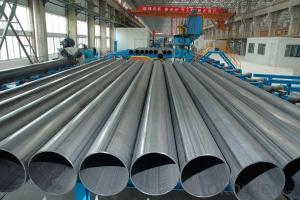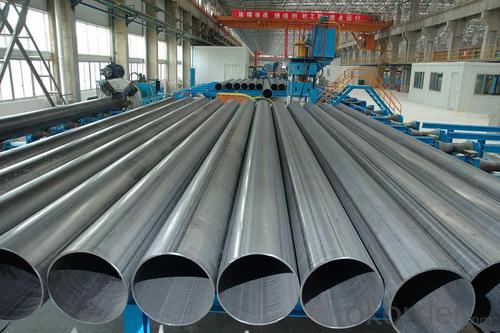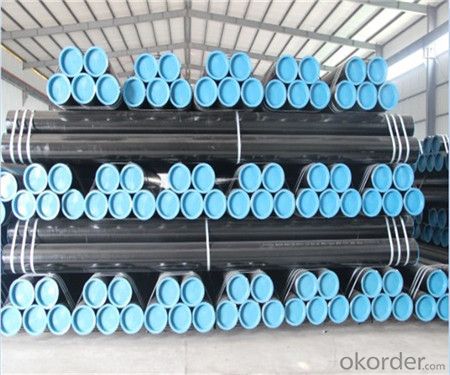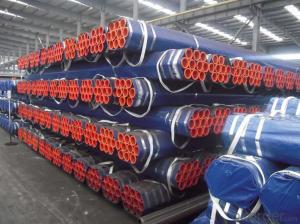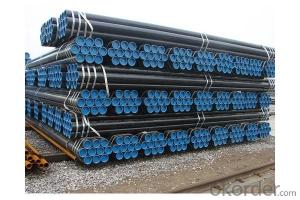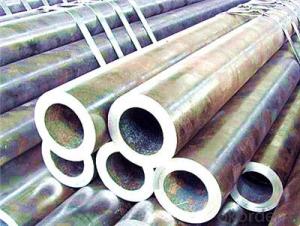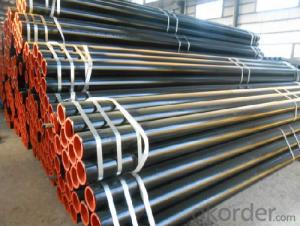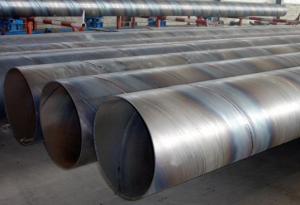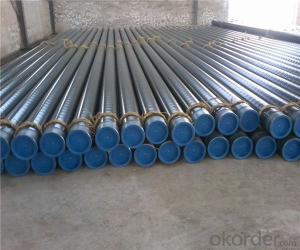BS, GB, ASTM ERW STEEL PIPE High Quality Best Price
- Loading Port:
- Tianjin
- Payment Terms:
- TT or LC
- Min Order Qty:
- 20 m.t.
- Supply Capability:
- 15000 m.t./month
OKorder Service Pledge
OKorder Financial Service
You Might Also Like
1、Structure of BS, GB, ASTM ERW STEEL PIPE High Quality Best Price:
ERW steel pipe is electric resistance welding, the abbreviation for ERW for transporting oil and natural gas vapor liquid objects, can meet the requirements of high and low pressure, the transport in the world with pipe sector accounted for a pivotal position.
2、Main Features of BS, GB, ASTM ERW STEEL PIPE High Quality Best Price:
• High manufacturing accuracy
• High strength
• Good visual effect
• Reasonable price
• Small inertia resistance
• Strong heat dissipation ability
3、BS, GB, ASTM ERW STEEL PIPE High Quality Best Price Specification:
Standard | GB, DIN, ASTM ASTM A106-2006, ASTM A53-2007 |
Grade | 10#-45#, 16Mn 10#, 20#, 45#, 16Mn |
Thickness | 1 - 33 mm |
Section Shape | Round |
Outer Diameter | 21 - 610mm |
Place of Origin | Tianjin, China (Mainland) |
Secondary Or Not | Non-secondary |
Application | Hydraulic Pipe |
Technique | Cold Drawn |
Certification | API |
Surface Treatment | factory state or painted black |
Special Pipe | API Pipe |
Alloy Or Not | Non-alloy |
Length | 5-12M |
Outer Diameter | 21.3-610mm |
Grade | 20#, 45#, Q345, API J55, API K55, API L80, API N80, API P110, A53B |
Standard | ASME, ASTM |
1) Material:20#(ASTM A 106/A53 GRB.API5LGRB,GB),45#,16Mn,10#.
2) Specification range:OD:21.3-610mm,WT:6-70mm,length:6-12m or according to the requirement of clients.
3) Excutive standards:GB,ASME API5L.ASTM A 106/A53,Despite of the above standards,we can also supply seamless steel pipe with standard of DIN,JIS,and so on,and also develop new products according to the requirements of our clients!
4) Surface:black lacquered,varnish coating or galvanized.
5) Ends:Beveled or square cut,plastic capped,painted.
6) Packing:bundles wrapped with strong steel strip,seaworthy packing.
4、Packaging & Delivery
Packaging Details: | seaworthy package,bundles wrapped with strong steel strip |
Delivery Detail: | 15-30days after received 30%TT |
5、FAQ of BS, GB, ASTM ERW STEEL PIPE High Quality Best Price:
①How is the quality of your products?
Our products are manufactured strictly according to national and internaional standard, and we take a test
on every pipe before delivered out. If you want see our quality certifications and all kinds of testing report, please just ask us for it.
Guaranteed: If products’ quality don’t accord to discription as we give or the promise before you place order, we promise 100% refund.
②How about price?
Yes, we are factory and be able to give you lowest price below market one, and we have a policy that “ for saving time and absolutely honest business attitude, we quote as lowest as possible for any customer, and discount can be given according to quantity”,if you like bargain and factory price is not low enough as you think, just don’t waste your time.Please trust the quotation we would give you, it is professional one.
③Why should you chose us?
Chose happens because of quality, then price, We can give you both.Additionally, we can also offer professional products inquiry, products knowledge train(for agents), smooth goods delivery, exellent customer solution proposals.Our service formula: good quality+good price+good service=customer’s trust
SGS test is available, customer inspection before shipping is welcome, third party inspection is no problem.
6.Images
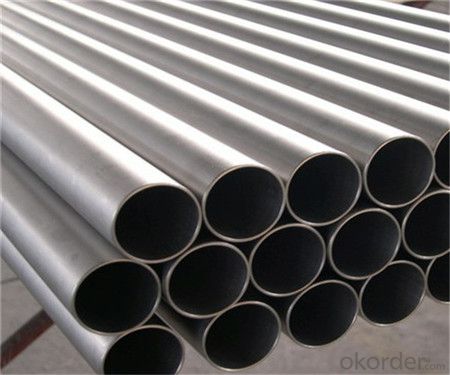
- Q: What type of steel pipe dance is used in general?
- The steel pipe fittings used in the pipe dance are made of smooth surface material, usually chrome or polished by steel or iron.
- Q: Can steel pipes be used for the construction of high-rise buildings?
- Yes, steel pipes can be used for the construction of high-rise buildings. Steel pipes offer several advantages such as high strength, durability, and resistance to fire and corrosion. They can be used for various structural elements including columns, beams, and bracing systems, providing a reliable and cost-effective solution for constructing tall buildings.
- Q: How are steel pipes coated to prevent corrosion?
- To prevent corrosion, steel pipes can be coated using different methods and materials. One common approach is to apply a protective layer of paint or epoxy on the pipe's surface. This coating acts as a barrier between the steel and the external environment, preventing direct contact with moisture and corrosive substances. Another technique involves galvanization, where the steel pipes are coated with a layer of zinc. Zinc is highly resistant to corrosion and acts as a sacrificial anode. In case of any damage to the coating, the zinc corrodes instead of the steel, ensuring the steel remains intact and free from corrosion. Polyethylene or polypropylene materials can also be fused onto the steel surface, creating a strong bond that provides excellent resistance against corrosion. This method, known as fusion bonding, is commonly used in offshore and underground pipelines. Moreover, a layer of corrosion-resistant alloy can be applied to the steel pipe. This alloy is typically a combination of metals such as nickel, chromium, and molybdenum, which offer superior protection against corrosion in harsh environments. The choice of coating method depends on factors like operating conditions, the presence of corrosive substances, and the expected lifespan of the steel pipes. By effectively applying these coatings, steel pipes can be safeguarded against corrosion, extending their durability and ensuring the integrity of the infrastructure they are used in.
- Q: How are steel pipes used in LNG terminals?
- Steel pipes are used in LNG terminals to transport liquefied natural gas from storage tanks to processing facilities or to ships for export. These pipes are highly durable and can withstand the extreme cold temperatures of LNG, ensuring safe and efficient transportation of this valuable energy resource.
- Q: What are the different types of steel pipe supports for high-temperature applications?
- Some different types of steel pipe supports for high-temperature applications include hangers, clamps, brackets, and anchors. These supports are designed to withstand the elevated temperatures and provide stability and proper alignment to the piping system.
- Q: How are steel pipes classified based on their end connections?
- Steel pipes can be classified based on their end connections into threaded, socket weld, butt weld, and flanged connections.
- Q: What is the buckling type thin-wall steel pipe? What is a tight set of thin-walled steel tubes? What's the difference between the two?
- The wire pipe thread (box, cup lock fastening points) (JDG) and buckling type (KBG) two. Products are made of high-quality steel pipe, through precise stamping molding, supply pipe and terminal box connection. The nut is hexagonal, and the convex point is punched at the six corner so as to form a good multi-point contact after being connected with the junction box.
- Q: Can steel pipes be used for underground drainage?
- Yes, steel pipes can be used for underground drainage. Steel pipes are commonly used in underground drainage systems due to their durability, strength, and resistance to various environmental factors. They are able to withstand heavy loads, pressures, and corrosion, making them suitable for long-term underground drainage applications.
- Q: How are steel pipes used in the construction of underground parking garages?
- Steel pipes are commonly used in the construction of underground parking garages for various purposes such as drainage, ventilation, and structural support. They are used as conduits for underground utilities, including water supply and sewage systems. Additionally, steel pipes are often used as piling or foundation elements to provide stability and support to the structure, especially in areas with challenging soil conditions. Overall, steel pipes play a crucial role in ensuring the functionality and durability of underground parking garages.
- Q: Are steel pipes resistant to impact or external forces?
- Yes, steel pipes are generally resistant to impact or external forces due to their inherent strength and durability. They can withstand high pressure, heavy loads, and harsh environmental conditions, making them suitable for various applications, including construction, transportation, and industrial purposes.
Send your message to us
BS, GB, ASTM ERW STEEL PIPE High Quality Best Price
- Loading Port:
- Tianjin
- Payment Terms:
- TT or LC
- Min Order Qty:
- 20 m.t.
- Supply Capability:
- 15000 m.t./month
OKorder Service Pledge
OKorder Financial Service
Similar products
Hot products
Hot Searches
Related keywords
